The Cheapest Countries to Study in Europe for Master’s Students (2024)
10 min readThe cheapest countries to study in Europe for Master’s students
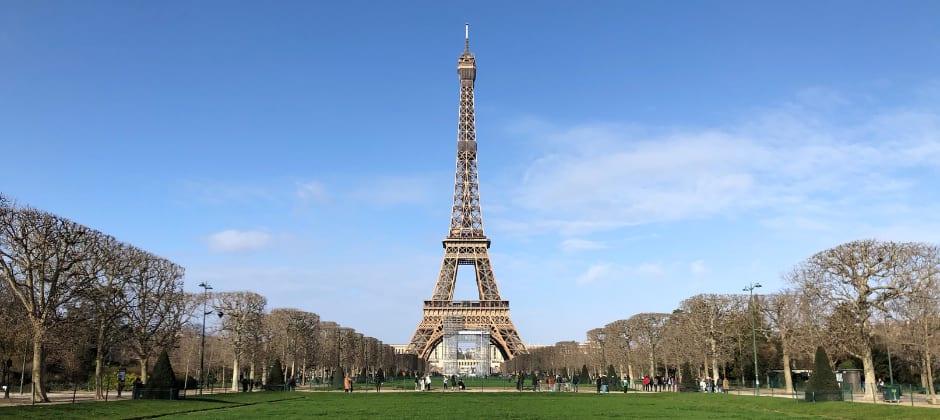
France
Highlights:
- Universities from the top 30 of QS European University Rankings
- Free for EU/EEA/Swiss citizens
- Rich in culture and tradition
France is a popular study-abroad destination for international students, with more than 250,000 students choosing the country. This is not surprising as France is ranked 5th globally and 3rd in Europe among the top study destinations. With its rich cultural heritage, cuisine, sightseeing options, and internationally acclaimed universities in the top 30 of QS European University Rankings 2024, it is the 2nd most preferred destination for students who want to experience a new culture or lifestyle.
Did you know that studying in France is one of the more cost-effective study options in Europe? The Master’s programs are very affordable for EU/EEA/Swiss citizens, costing only €243 per year. For other students, the tuition fee is €3,770 per year, regardless of their course. However, please note that you may be required to pay for the full year upfront. Fortunately, the French government and Erasmus+ program offer various scholarships to students who wish to pursue their academic studies in France.
Even though the cost of living in France may not be the cheapest, it is definitely worth it. French culture places a high value on good food, as well as art and architecture. Additionally, studying in France grants you easy access to other European countries. It’s a great opportunity to live out your dream!
There are numerous student accommodations available, which means you can avoid paying a deposit and save money on rent. Choosing this option can also help you make social connections. If you prefer to rent a private apartment, keep in mind that finding a furnished one may be challenging.
| Tuition fees for EU/EEA/Swiss citizens | €243 |
| Tuition fees for non-EU/EEA/Swiss citizens | €3,770 |
| Cost of living (per month) | €600 – €800 |
Learn more about how much it costs to study in France in our Country Guide.
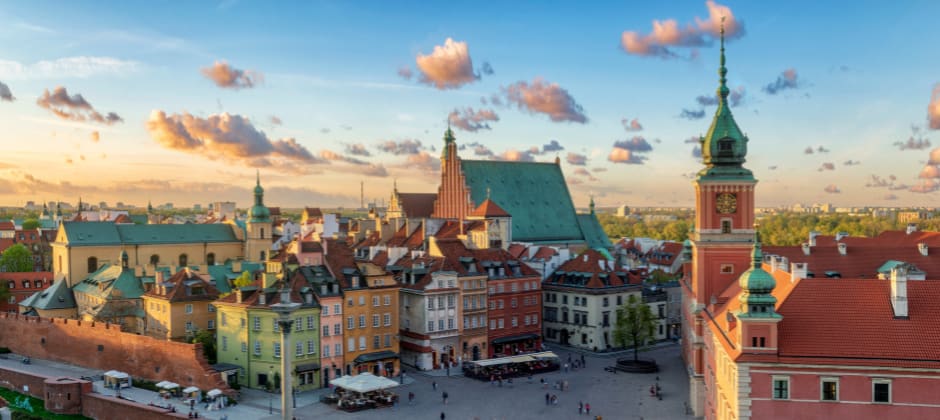
Poland
Highlights:
- All programs in Polish are free
- The cost of living is quite low
- A rich history and tasty food
Poland is a perfect study abroad destination for international students who wish to fully immerse themselves in a rich and exciting culture at a cheaper price point.
Students enrolled in Polish-language Master’s courses study for free regardless of nationality. This makes Poland a wonderful choice for students looking for a unique international experience. If would rather study in English, tuition fees apply, typically a few thousand euros per year depending on the university and program. Many scholarship and loan opportunities are available to help international and exchange students fund their studies. Also, students in Poland can work up to 20 hours per week while attending classes or full-time during the three months of summer vacation.
The amount you spend on tuition is balanced by the amount you save on living expenses, particularly since prices in Poland are some of the lowest in Europe, especially compared to the rest of the EU. On average, you’ll need between €300 and €700 per month, even less if you’re able to get student accommodation, and this makes it one of the cheapest countries to study abroad in Europe.
| Tuition fees for programs in Polish | Free |
| Tuition fees for programs in English | around €3,500 |
| Cost of living (per month) | €400 – €700 |
Learn more about how much it costs to study in Poland in our Country Guide.

Greece
Highlights:
- Low cost of living
- Studying in public universities is very affordable if not free
- A Master’s degree takes only 1.5 years to get
With its stunning beaches, warm climate, and delicious Mediterranean cuisine, combined with a rich history and tradition of high-quality education, it’s no surprise that Greece is a popular choice for many international students.
There are no tuition fees for EU/EEA/Swiss Master’s students at Greek universities. Those who do pay fees only pay around €1,500 to €2,000 per year on average, which is very affordable, considering that a Master’s degree can take only 3 semesters. There are many programs in English in Greece, but Modern Greek language courses are also available around the country for those seeking a complete international experience.
International students can work up to 20 hours per week during the semester, or up to 40 hours (full-time) during the summer holiday season. The average pay is between €500 and €700 per month depending on the city and job.
Greece has a lot to offer in terms of scholarship opportunities. For example, the country-wide scholarships offered by the Greek State Scholarship Foundation, and some university-specific scholarships.
Moreover, the prices in Greece tend to be very cheap outside of the biggest tourist destinations. On average, you can expect to spend €450 – €750 per month on living expenses, most of which will go towards paying for accommodation.
| Tuition fees for EU/EEA/Swiss citizens | Free |
| Tuition fees for non-EU/EEA/Swiss citizens | €1,500 – €2,000 |
| Cost of living (per month) | €450 – €750 |
Learn more about how much it costs to study in Greece in our Country Guide.
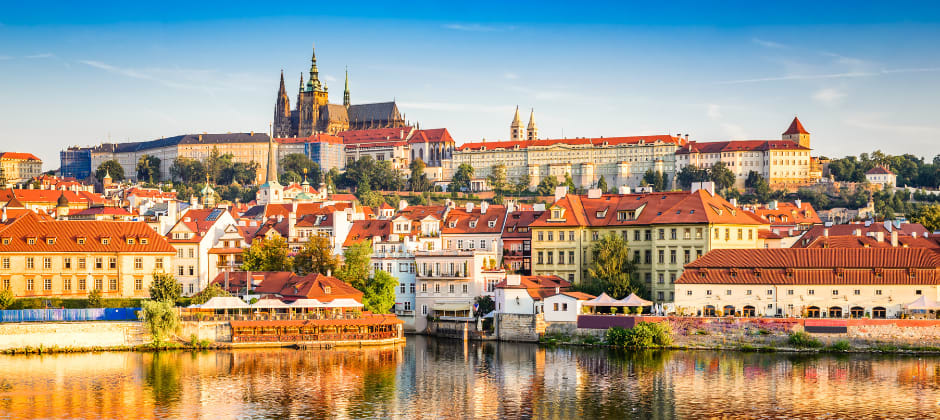
Czech Republic
Highlights:
- All Czech-speaking programs are free
- Low cost of living
- A rich history and beautiful architecture
The Czech Republic attracts international students with its rich cultural heritage, intriguing history, and exceptional foods and beers. On top of that, it is a very affordable country for Master’s studies.
Higher education at public institutions remains free for all nationalities for courses in Czech. If you choose to study in English, you’ll have to pay between €4,000 and €11,000 per year. But don’t worry, low living costs can compensate for that. The Czech Republic is one of the cheapest places to live in Europe. Additionally, there are many scholarships and loans available to fund your Master’s studies.
The additional expenses are also comparatively low: visa and application fees are on the lower end, and student dorms are available at the majority of universities.
| Tuition fees for programs in Czech | Free |
| Tuition fees for programs in English | up to €11,000 |
| Cost of living (per month) | €260 – €650 |
Learn more about how much it costs to study in Czech Republic in our Country Guide.
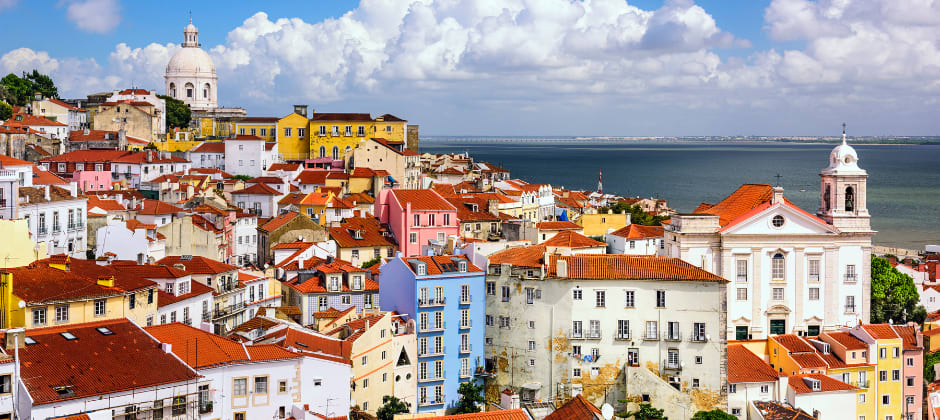
Portugal
Highlights:
- Low or affordable tuition fees
- Lower cost of living than most of Western Europe
- Warm weather, beautiful nature, and friendly locals
Portugal is an all-around excellent study abroad destination for students on a budget, boasting excellent quality of education and a warm and welcoming culture, all at a reasonable price.
Tuition fees for a Master’s in Portugal are around €550 – €2,500 for EU/EEA/Swiss citizens, and €3,500 – €7,000 for students from countries outside of the EU. However, in some private universities, you can be exempted from paying for the lectures depending on your final grades. If you are considering getting a job, non-EU/EEA/Swiss citizens studying in Portugal on a student visa can work for up to 20 hours per week during their studies and full-time during the summer.
Portugal has many opportunities for international students to fund their studies with public and private scholarships. Some are state-funded, some are offered by individual universities, others are merit-based, and some are set in place for students in particular fields, like the scholarships for studies in Portuguese language and culture.
Being a student in Portugal is cheap compared to the rest of Western Europe. On an average month, the cost of living can range from €500 to €800.
Therefore, Portugal is one of the cheapest countries to study in Europe. It offers high-level education at a much lower cost than other European countries, while providing excellent international student experience and travel opportunities.
| Tuition fees for EU/EEA/Swiss citizens | €550 – €2,500 |
| Tuition fees for non-EU/EEA/Swiss citizens | €3,500 – €7,000 |
| Cost of living (per month) | €500 – €800 |
Learn more about how much it costs to study in Portugal in our Country Guide.
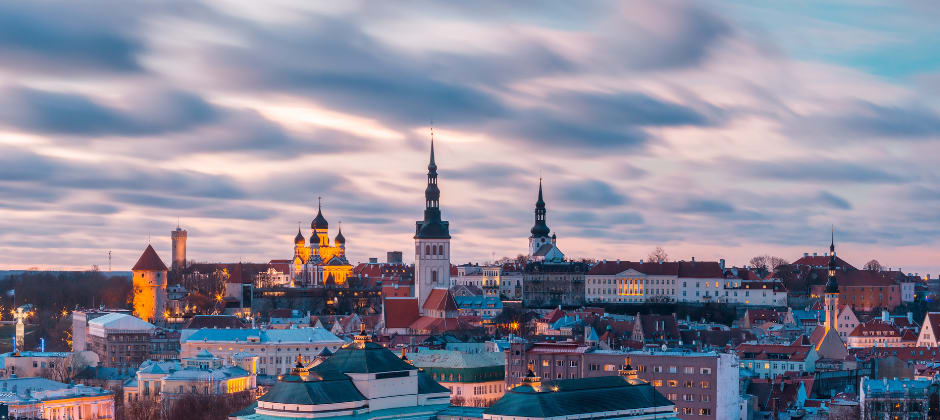
Estonia
Highlights:
- Free or affordable tuition fees
- Low cost of living
- Excellent work-study conditions
The hidden gem of Europe, this Baltic country is slowly climbing the ranks of countries that provide quality education for international students who are looking for affordable study destinations.
Master’s programs conducted in the Estonian language are completely free of charge for all students, and the tuition fees for programs in English range from €1,600 to €7,500 per year, with many scholarships and loan opportunities available to help with financing.
The cost of living in Estonia is quite low compared to the rest of Europe – only around several hundred euros per month, which makes it a very attractive choice as a study-abroad destination.
Additionally, international students can work for up to 15 hours per week during term time and up to forty hours per week during holidays. Students can expect to earn between €550 and €1,500 per month. Fresh graduates even have the opportunity to stay in Estonia for an additional 9 months to look for a job.
| Tuition fees for programs in Estonian | Free |
| Tuition fees for programs in English | €1,600 – €7,500 |
| Cost of living (per month) | €350 – €750 |
Learn more about how much it costs to study in Estonia in our Country Guide.
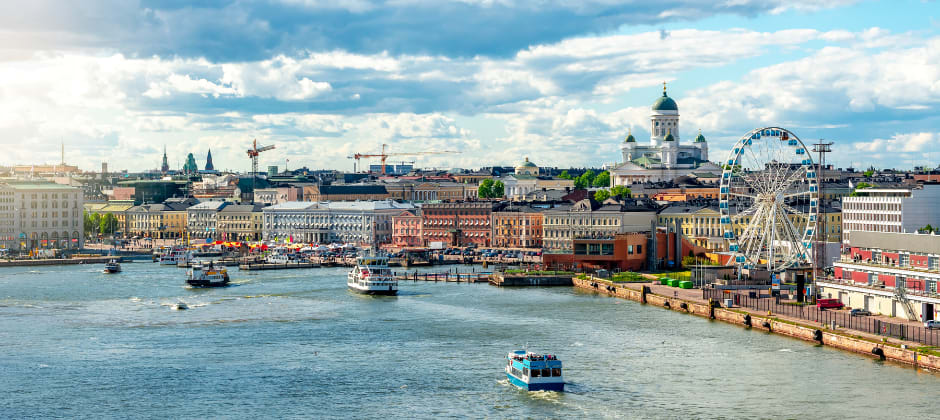
Finland
Highlights:
- Free for EU/EEA/Swiss citizens
- Excellent quality of education
- Breathtaking nature
Home to one of the best education systems in the world, as well as several top-ranking universities, Finland is ideal for anyone seeking a high-quality education abroad.
While tuition at Finnish universities is free for Master’s students from Finland and other EU countries, tuition fees for international Master’s students range anywhere from €5,000 to €18,000 per year.
However, there are plenty of funding opportunities for education in Finland. Many universities award scholarships to international students, which are primarily based on academic merits. You can find some opportunities for a full ride, but scholarships for a percentage deduction on tuition fees are more common.
Also, most Finnish universities provide career services for international students. They can lend a hand during your job search, whether you’re looking for a student job, or a full-time position for after you graduate. If you’re interested in working part-time during your term abroad, keep in mind that your student visa will allow you to work for up to 25 hours per week.
As for the living costs, you can expect to spend around €700 – €900 every month. There are also various benefits and discounts available for you as a student living in Finland. Student housing is very accessible and staying at a university dormitory or student residence hall is an option in many institutions in Finland, so make sure to contact your university about their housing opportunities.
| Tuition fees for EU/EEA/Swiss citizens | Free |
| Tuition fees for non-EU/EEA/Swiss citizens | €5,000 – €18,000 |
| Cost of living (per month) | €700 – €900 |
Learn more about how much it costs to study in Finland in our Country Guide.
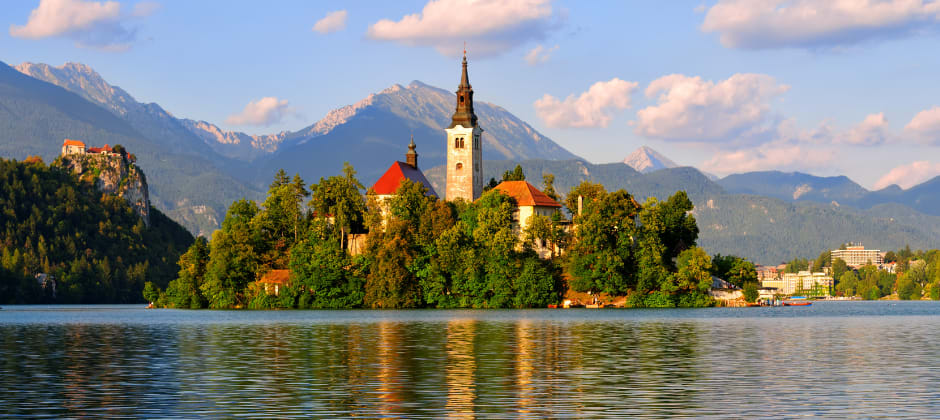
Slovenia
Highlights:
- Free or affordable tuition fees
- Low cost of living
- A warm and welcoming country with gorgeous nature
Slovenia is a country located in southern Europe, known for its breathtaking natural scenery, delicious cuisine, and friendly locals. International students who choose to study in Slovenia can receive a top-notch education at a much lower cost than in most of Europe.
For Slovenian nationals, EU/EEA/Swiss citizens, country residents, and a handful of non-EU countries a Master’s degree is free. This makes it one of the cheapest countries to study in Europe in terms of tuition, but even for students outside of the EU and a few non-EU countries, the fees are lower than in most other European countries.
There are many scholarship opportunities for tuition-paying students in Slovenia, but the most significant factor for cost-saving here is the low cost of living. You’ll need from €400 to €700 every month depending on your lifestyle.
If you want to find a part-time or temporary job as a foreign student in Slovenia, individual universities’ career centers and Student Services are there for you, or, of course, you can go to employers directly. On average, you can expect to earn between €350 and €500 per month working in Slovenia.
| Tuition fees for EU/EEA/Swiss citizens and other specified countries | Free |
| Tuition fees for non-EU/EEA/Swiss citizens | €5,000 – €15,000 |
| Cost of living (per month) | €400 – €700 |
Learn more about how much it costs to study in Slovenia in our Country Guide.
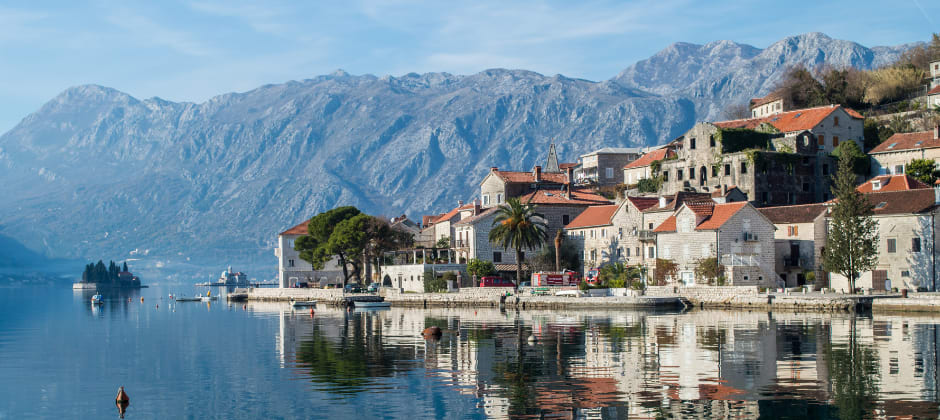
Montenegro
Highlights:
- Free education at public universities
- Low cost of living
- Spectacular mountains, glacial lakes, and beautiful beaches
If you’re considering studying in Southeastern Europe, Montenegro is an excellent destination to explore. Nowhere else can you find so much natural wealth, beauty, mild beaches, clear lakes, fast rivers, and gorgeous mountains in such a compact area. Getting a Master’s degree in Montenegro can be an attractive option for international students due to several reasons.
Public universities charge no tuition fees. For individuals who prefer a private university education, the cost is relatively affordable, with an average fee of approximately €3,000 per year. There are also numerous Master’s programs available in English for international students who wish to study in this region. Students can enjoy a multi-cultural experience, as Montenegro has academic agreements with various countries worldwide.
Living costs are low, expect to spend around €600 monthly. Student accommodation is not that easy to get, but renting a private apartment is affordable at around €300 a month.
| Public universities | Free |
| Private universities | €2,000 – €4,500 |
| Cost of living (per month) | €400 – €850 |
Learn more about how much it costs to study in Montenegro in our Country Guide.
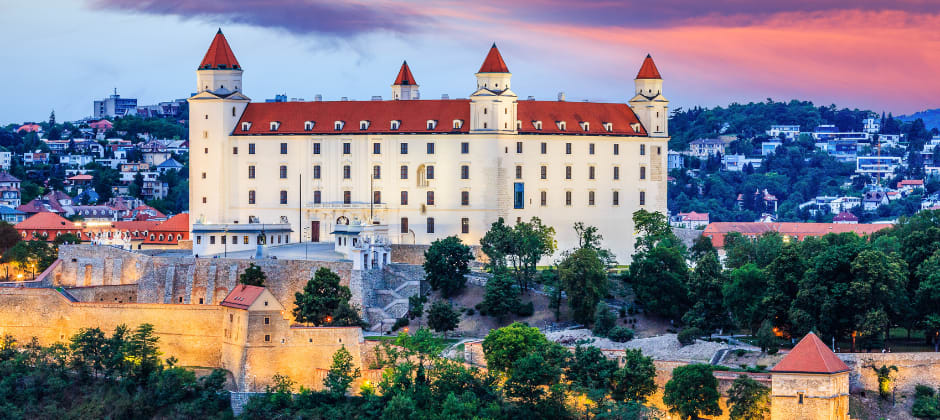
Slovakia
Highlights:
- Free or affordable tuition fees
- Plenty of internship and graduate job opportunities
- Unique architecture and nature
Slovakia is a country that hosts prestigious educational institutions such as Comenius University, the University of Economics Bratislava, and the Bratislava International School of Liberal Arts. Besides its quality education, Slovakia is currently undergoing an economic surge, creating plenty of internship and job openings for fresh graduates.
Master’s programs in Slovak language are free for all students regardless of their nationality. If you are a citizen of the EU, EEA, or Switzerland, you can also enjoy programs in other languages for free. However, students who are non-EU/EEA/Swiss citizens will need to pay for the education. The average tuition fee ranges from €2,200 to €5,500 per year, which is still affordable. Additionally, there are scholarships and loans available for students who need financial assistance.
The living costs are not the lowest, but you can save money by living in student dormitories which are not hard to get. Also, all the additional fees are fairly low.
| Public universities | Free |
| Private universities | €2,000 – €4,500 |
| Cost of living (per month) | €400 – €850 |
Learn more about how much it costs to study in Slovakia in our Country Guide.


